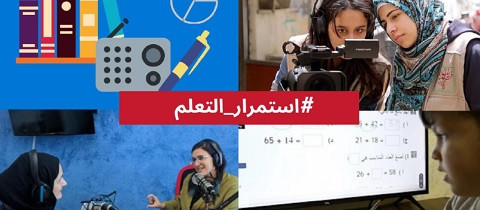
GCED Basic Search Form
Quick Search
当前位置
新闻

In the Arab region, where 13 million children and youth are already out-of-school due to conflict, an additional 100 million learners have been affected by school closure due to the COVID-19 pandemic. In a similar manner as countries of other regions, some Arab countries have adopted online learning modalities to provide alternative educational resources for students amid suspension of regular classes. However, given that more than half (51.3%) of the population in the Arab States are not using the Internet nor mobile internet, TV-based learning is the most widely adopted measure as opposed to radio-based learning, which is only used in a handful of countries identified by the report of the UNESCO Regional Bureau for Education in the Arab States on “Alternative Solutions to School Closure in Arab Countries”.
Against this backdrop, the UNESCO Regional Bureau for Education in the Arab States (UNESCO Beirut) joined hands with the Division of Policies and Lifelong Learning Systems in the Education Sector at UNESCO Paris, the European Broadcasting Union (EBU) and the Arab States Broadcasting Union (ASBU), to organize on 21 July 2020 a virtual workshop to facilitate knowledge sharing on educational radio and television broadcasts, in the context of school closures during and after COVID-19.
The webinar started with the opening remarks of Dr Hegazi Idris, Programme Specialist for Basic Education and Literacy at UNESCO Beirut, who raised the following questions: “How can quality audio-visual educational programmes be developed and implemented? What capacities are needed? What is the role of educators, communicators and education authorities in supporting TV and radio-based education? What are the expected learning outcomes and how can they be measured and monitored?”
Then, Ms. Sara Bin Mahfooz, Programme Specialist at the Division of Policies and Lifelong Learning Systems at UNESCO Paris, presented a global overview of the use of TV/Radio in the context of the continuity of learning in the Arab region. Ms Bin Mahfooz said: “With the outbreak of the pandemic, UNESCO conducted a survey to monitor the use of radio and TV by Member States to ensure the continuity of learning. The study showed that 92 countries have TV or radio-based education programs- 10 percent of which are Arab States”. She added: “Survey results show that 11 out of the 13 countries in the Arab region are using TV and only 3 are using Radio”. Bin Mahfooz presented recommendations as to how to improve the quality of distance learning through Radio and TV, including the following: establishing effective collaboration between the public and private sector; being innovative in the delivery of TV/radio educational programmes through, for example, engaging celebrities and influencers to attract the learners; developing mechanisms for monitoring and assessment of learning when using TV/Radio to monitor progress ; developing educational programmes through TV and Radio as a means for learning even after the crisis is over.
Mr Hani Hamed, consultant at UNESCO Beirut, presented a regional overview of the use of TV/Radio in the context of the continuity of learning. He highlighted that teaching through TV/Radio was an effective means to overcome the digital divide and provide education to children who do not have access to the internet. Hamed also spoke of the challenges and lessons learnt, and provided recommendations to improve the quality of education through TV and radio, including: ensuring the quality of educational programs, motivating learners especially the youngest among them, developing educational programmes for life skills and supporting children and families emotionally and socially, adopting various types of live and recorded broadcasts, developing partnerships with the telecommunications sector.
Then, Ms Nicola Frank, Head of Institutional and International Relations at the European Broadcasting Union, spoke of the importance of public-private partnerships to ensure the continuity and quality of learning, and highlighted the key role of the Global Coalition for Education launched by UNESCO in this regard.
This was followed by country presentations: Mr. Mohamed El Moustapha Idoumou Abdi Jiyed, General Secretary at the Ministry of Education in Mauritania presented the Mauritanian experience in the field of Radio/TV learning; Mr. Mohamad El Mokhtar, Deputy General Director of the educational channel at the Ministry of Education in Yemen, spoke of the Yemeni experience; Mr. Hammadi Ghidaoui, Chief Editor at the Tunisian Public Television spoke of the Tunisian experience; and Ms. Hilda Khoury, Director of the Counselling and Guidance Department (DOPS) at the Ministry of Education and Higher Education in Lebanon, and Ms. Souhad Dandash, General Coordinator for the Special Education Unit at DOPS, presented the Lebanese experience. In addition, Mr. Robert Fortuijn, Channel Manager Zapp & Zappelin, Public Broadcaster, NPO, Netherlands, made a presentation about educational Radio and TV programmes in the Netherlands, presenting the challenges, lessons learnt, and concrete examples and success stories.
The event concluded with the remarks of Dr Hegazi Idris and Mr. Gwang-Chol Chang, Chief of the Division of Policies and Lifelong Learning Systems at UNESCO Paris, who praised the efforts made by the states in the Arab region to ensure the quality and continuity of learning despite school closure, and who reasserted the importance of public-private partnerships to guarantee that learning never stops, highlighting the successful example of the Global Coalition for Education launched by UNESCO at the beginning of the COVID-19 crisis.
The virtual workshop provided an opportunity to share knowledge, exchange good practices in the development of educational audiovisuals, and share regional challenges and opportunities of using TV and radio in distance learning in order to strengthen collaboration between educational content developers and audiovisual specialists. The recordings of the workshop will serve as a basis for the production of modules and other resources for all interested countries.
URL:
